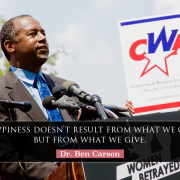Top 10 Podcasts You Could Be Listening To (and 5 You Can Start On!)
Inspired by Cam’s video above, I thought I’d share with you all the podcasts that yours truly listens to as well. I mean, one of the things that we want to do in the newly created New Inceptions Masterminder group on Facebook is feature other people’s work. Not only does it build community when you promote others, but it also helps people find things they might not have known about in the past.
One of the things that LTD talked about all the time and that you might have heard is the phrase Leaders are Readers.
And I think that phrase has it’s merit. I believe to be a leader that you constantly have to be learning. When you’re learning, you’re moving forward. Likewise, if you’re not learning, you’re moving backwards.
However I believe that in today’s age many people don’t read as much as they used to. For example, while Facebook is full of text, it’s the videos that tend to go viral – not posts. For me, I’m naturally an audio person. I feel that videos and books must have your full attention to leave an impression. However, with audio (radio, podcasts, books on tape) I feel that you can be doing something (driving, walking, working out) and still be somewhat engaged in the material that you’re listening to.
So audio, I believe, is the one medium that every expert or online business person should be utilizing to build their audience. I’d imagine that podcasters would agree with this.
If you’ve never listened to a podcast, it’s never too late to start. Podcasts are generally free and can range in all kinds of topics, as Cam mentioned in the video above. I’ve been aware of them since I first had an iPod (2007’ish) but I believe they’ve been around longer than that. The reason you might not have heard too much about them is because they’ve been in somewhat of a rollercoaster of popularity over the years, but I think this current swing is a fairly large one.
So to help you get started (or maybe to just give you some more options), I’m going to share with you 10 podcasts that I’m currently listening to on a regular basis. And then, I’m going to give you my top 5 that I recommend that you should definitely add to your list whether or not you currently listen to them or are a newbie listener.
I will point out that I don’t expect you to listen to all of these all the time. Unless you commute daily and consider your car to be a mobile university, my recommendation would to pick topics that interest you.
The Top 10 Podcasts I’m Currently Listening To:
Smart Passive Income (Average Run Time [ART]: 45 minutes) – This is the first podcast that I ever started listening to. Over the years, Pat has done remarkably well with it. While I don’t visit his blog as much as I once did and don’t find myself regularly checking out his other material (which includes 2 more podcasts, a regular programmed YouTube channel, and “playing” around on Periscope), I do keep coming back to the original podcast. I think the main reason is his wide scope of guests that he has on the show. While he does manage to get big names on there from time to time (Gary Vee and Tim Ferris to name a couple), I think his real bread and butter is highlighting normal people who have successfully built an online business.
Solopreneur Hour (ART: 1 hour+) – Michael and his show recently came on the radar a couple of months ago when he was interview by Pat. I completely love his style of talking with people very casually. Just in the little bit of time that I’ve been listening, there have been HUGE bombs of wisdom dropped that I’ve used in either mindset or just getting things done. His background is definitely interesting in that he’s had big swings in his success. He’s killed it recently in the MLM world, but before that he moved from one place to another, struggling as he went. Oh and he loves his dog.
Joel Osteen Podcast (ART: 25 minutes)- This particular “podcast” helped me quite a bit when I lost my mom back in 2011. I was going through a transitional time in my life and having her pass just added to all the emotions of leaving college and entering “the real world”. While Joel might not be everyone’s cup of tea, I do think that certain people that are on hard times can be picked up by his inspirational message. Generally Maria and I will listen to this one together. (Also, there’s a video version of it as well as it’s simply the recording of his weekly televised show.)
The Charged Life (ART: 12 minutes) – Not as spiritual as Joel’s podcast, Brendon’s podcast is a quick message that he delivers about certain topics related to getting his listeners out of what he calls the “Caged” and “Comfortable” life. Like Joel’s podcast, there’s a video version of this one too which you can find on YouTube.
The Way I Heard It (ART: 5 – 7 minutes) – As being a fan of Mike Rowe since he started Dirty Jobs, I feel like I’m kind of in the same boat as him. Especially when it comes to how he is amazed by interesting people who do interesting things. This particular podcast was talked about during his interview with Tim Ferriss, and I thought I’d give it a go. Really glad I did! If you liked Paul Harvey’s The Rest of the Story, then you’ll love this – which is done in the same fashion.
Unmistakable Creative (ART: 55 minutes) – This show originally started out as the Blogcastfm.com show which was geared pretty much towards to what Pat talks about. In fact, Pat had Srinivas, the host, on his show back in 2013. However, around the time that Srini was on Glenn Beck’s show, was when the podcast was changed to it’s current form. At any rate, I’m still a fan of Srini’s and love the guests that he has on here.
The Fizzle Show (ART: 1 hour) – Another podcast and group I heard about from Pat’s podcast. While I love Pat, having three hosts on a podcast sounded very unique to me. While this format works well on the radio, not many people have used it for pure podcasting – at least not with the ones I’m familiar with. It’s because of this show that we decided to go with format that we did for the Angles of Lattitude Podcast. (Also, remember, that you can get your first month of being a Fizzler for free by going through this link here.)
Art of Charm (ART: 15 minutes to 1 hour) – Jordan Harbinger and his pals started the Art of Charm as a coaching service to guys who wanted to be better men. For a long time, that was the focus of the show. However, as soon as I started listening to the show regularly in 2012-2013, they started changing the focus a little more on just finding out how interesting guests became their current successful self. I will say that if you’re anyone who needs to work on your self image or confidence, that this might be a show worth your time to listen to. Guests on the show include upper tier successes.
StarTalk Radio (ART: 50 minutes) – I think this was the 2nd podcast I started listening to. It’s funny, but Neil deGrasse Tyson is one of my favorite popular scientists in today’s pop culture. He was the 1st host of the recent Cosmos (there might be future seasons from what I hear) and he’s also known for his phrase “We have a badass over here”. So it seems fitting that he hosts a show (typically with a comedian co-host) where they talk with guests about pop culture and science.
The School of Greatness (ART: 5 minutes to 1 hour+) – Like many other podcasts that release multiple times a week, the School of Greatness by Lewis Howes has long shows and a short show on Friday. Personally, I picked his podcast up in 2013 when I heard that he had started it. Being familiar with him by him being Pat’s podcast (where else?) and talking about webinars and LinkedIn, I thought he might be interesting to listen to as well. Fast forward a couple of years and I think he’s more known for doing the show now than he was with those previous topics. Types of guests that he has on the show typically are pretty successful, but a lot of the time he tends to mix in some pretty good topic editions (those are normally his short ones).
My Recommended Top 5 Podcasts for the Podcast Newbie
If you’re just getting into podcasts, I wouldn’t recommend subscribing on iTunes to all of these just yet. Honestly, there’s a crap load of information coming from these folks and I don’t want you to get hammered with too much all at once. If you’re finding my list, there’s a good chance you have an interest in improving your career. So, what I’ll do for you is give you the ones I think would help you out the most in that quest. Then later on, you can come back and subscribe to the other ones I listen to for edutainment.
These are in order of how relevant they are based on where you might be in your career. The first three are for anyone while the latter two are geared more towards people who want to be experts in their field.
- Art of Charm – Basically just teaches people how to crush it all around – in their jobs, in their relationships, and in life. Jordan is very engaged with his guests which is interesting. You can tell he does his homework. He comes across as a fan of everyone he talks to.
- School of Greatness – Like the Art of Charm, however, Lewis lets the guest talk way more which definitely makes it a different show.
- The Charged Life – I think more people need to be aware of Brendon and what he offers. Ideally, at New Inceptions, we’re trying to help you move from a Caged or Comfortable life to a Charged Life as well.
- Smart Passive Income – I think it’s important that people know that there’s a way that you can make an income on the side using the skills that you already use day in and day out. While Brendon does that for a premium (he can, too – he shows you EVERYTHING you need to do to be a success in expert space) Pat shows you how to do it all for free. He’s also exposed so much of the world to me in general, that I couldn’t not post his show.
- Solopreneur Hour – I like his technique. It’s hard to say how much he actually researches his guests, but I think that adds to his style. He and Pat say that they don’t research their guests too much because they want to sound more authentic when finding things out. However, he does seem to know a lot about most of them. I like the conversation effect that this gives his show.
Homework:
I’d love for you to check these out and let us know what you think. If you’re a podcast newbie, take a listen to my recommended top 5 and let us know which one sounds the most interesting to you. What did you like about them? What didn’t you like about them? If you were to make a podcast, what would you focus on? If you’re already a host, please let us know about your podcast below. Be sure to tell us why you started it and what your focus is. Let yourself be heard!








